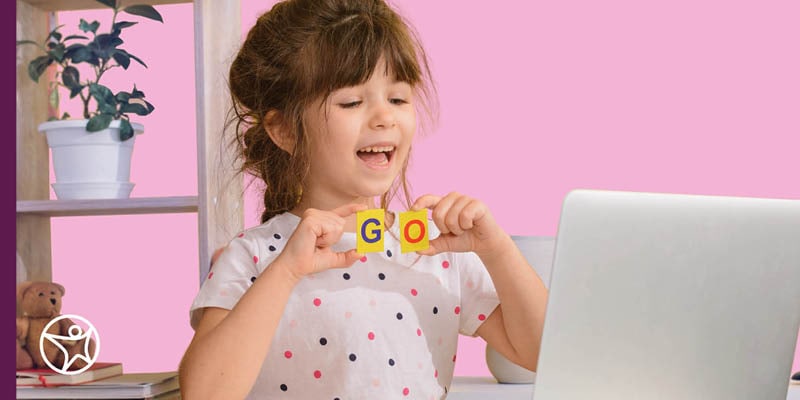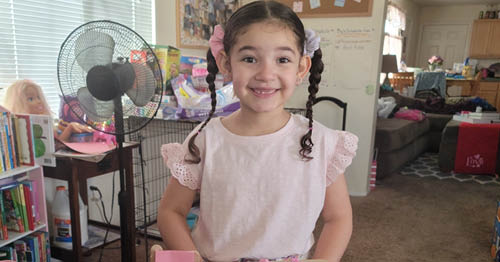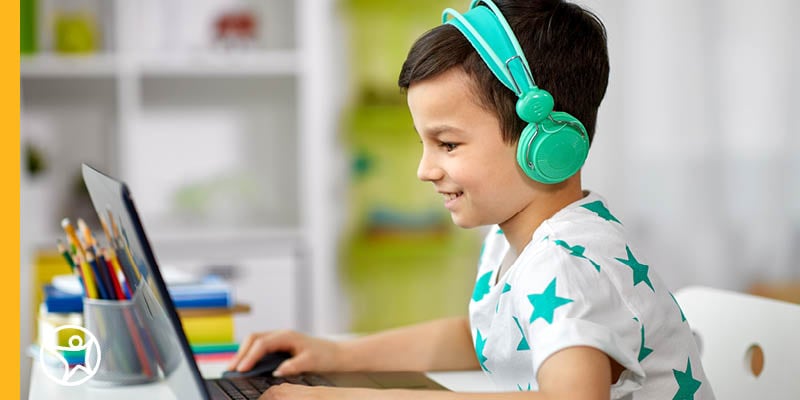How Does Online Preschool and Kindergarten Work?
byConnections Academy
5 min to read
Technology has transformed countless aspects of our daily lives, and education is no exception, as more and more families discover the benefits of online preschool and kindergarten.
But how does online preschool work? Is online learning good for preschoolers? And what are the important factors to consider when starting an online preschool or kindergarten?
How Does Online Preschool and Kindergarten Work?
“Going to school” looks a little different for online preschool and kindergarten students. Instead of drop-offs and pickups, these students and their Learning Coaches are powering on laptops and opening online learning platforms to learn from their teachers and classmates over a computer screen.
Most online preschool and kindergarten programs use some combination of live and pre-recorded lessons to engage preschoolers. Classes typically also feature interactive activities like stories, crafts, and virtual games, as well as asynchronous educational videos to reinforce learning.
To help preschool and kindergarten students through their learning day, online schools will usually require the student to work with a dedicated Learning Coach—a trusted adult who assists students with understanding assignments, communicates with the teacher about academic performance, and attests that the student is attending classes. Learning Coaches are especially needed for preschool and kindergarten if the student is not yet comfortable with navigating technology on their own or doesn’t have a firm grasp on reading yet.
Is Online Learning Good for Preschoolers and Kindergarteners?
According to recent scholarly research, online learning can in fact benefit preschool-aged students when implemented thoughtfully. Preschoolers and kindergarteners enrolled in a Connections Academy-supported school can benefit from learning in a more familiar environment—their own home—and are taught by state-certified teachers who are specially trained to teach online.
What Are the Benefits of Online Preschool and Kindergarten?
Flexibility and convenience
Students attend online preschool or kindergarten from the comfort of their own home or wherever is convenient for their family—a perk that can help reduce transportation burdens, simplify logistics, and even reduce stress around the home.
In families with multiple online students, online pre-K and kindergarten can be particularly convenient, as they can all learn in the same place and with the same Learning Coach.
Customized learning
Online preschools and kindergartens commonly leave room in the learning day to make space for personalized learning experiences for the student, adjusted to an individual student’s pace or learning preference. Learning Coaches and teachers frequently customize lessons for students based on their unique needs, strengths, and interests. Learning Coaches are also able to supplement their child’s education by applying different early education learning methods like Montessori or Waldorf.
Emotional safety and well-being
Learning online gives students a safe place to learn, which can be very helpful for anxious children or those who need additional support when it comes to medical or developmental needs.
A consistent caregiver or Learning Coach may be more aware of when and how to give the right type of emotional support when children feel discouraged or frustrated than a teacher who needs to care for a classroom full of other children. This close attention to emotional well-being generally helps foster more resilience and positive attitudes toward learning in children.
Access to more resources
Online kindergartens often provide families with access to a wide range of digital resources and educational tools that help enrich the online learning experience for their students. Early exposure to digital tools can also help children develop basic computer literacy as they learn to navigate online environments—essential in our modern world.
When to Start Preschool
Children generally start preschool around the age of 3 or 4. However, the ideal age can vary, depending on your child’s development and readiness for more socialization and structured learning. Increased curiosity and attention span, as well as maturing social skills are a few common indicators they’re ready.
However, due to a variety of circumstances, such as living in remote areas, student or family physical or emotional health issues, and more, 53% of 3- to 4-year-olds didn’t attend any preschool before kindergarten in 2022.

Factors to Consider When Starting Preschool or Kindergarten
When starting preschool, families will want to consider several important factors about their student, the school, and the family’s capacity for supporting their learning experience.
These factors include:
The student
Does your student learn best through visual, auditory, or kinesthetic means? Online learning can be highly visual and auditory.
Do they thrive in busy, interactive environments, or do they prefer more independent activities?
Can your student adequately express their needs, understand instructions, and communicate with others?
Does your student need an individualized learning path?
How much support will your student need to be successful?
The school
Are the instructors certified in early childhood education?
How much does the program cost?
Does the program offer resources to Learning Coaches?
If your student needs an individualized learning path, will the preschool program accommodate that?
Will preschool fit into your family’s daily life without causing stress?
Whether online or traditional, does the preschool allow for play time with peers either through virtual playdates or in-person activities?
Caregiver or Learning Coach
Is there an adult in the house that can support the preschool student during online sessions?
How to Enroll Your Child in Preschool or Kindergarten Online
Enrolling your student in an online school typically involves:
Researching online preschool programs. Look for reviews, curriculum details, and accreditation.
Completing an application.
Attending orientation sessions to get familiar with the online learning environment.
Gathering technology and other supplies for a suitable learning space.
Are There Free Online Preschools and Kindergartens?
Online public schools, like Connections Academy, offer tuition-free kindergarten classes for students. Some Connections Academy schools are also open to enrollment for pre-K students as well. Enter your zip code to see if your family is eligible to enroll in an online preschool or kindergarten.



